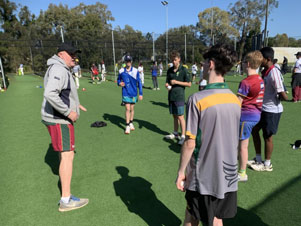After running coach and club inductions for the past 6 months - it got me thinking about how a volunteer coach can really make a difference with their team and what key habits lead to success.
Below are 4 skills that have helped me transition from a junior cricket volunteer into a professional junior coach over the past 8 years. Even if it’s something you’ve heard before - putting these into action will ensure you’re creating the best environment possible for the team's success and your own as a coach and leader.
1. PLANNING
{The ability to work through a plan with others}
The first step is making sure you have a thorough session plan to run with at training. Outline your drills, timings, and coaching points clearly and cohesively with you and your team prior to kicking off. It will make life a lot less stressful when you arrive and also give you the clarity to focus when it comes to delivering a quality session.
Mapping out an outline for the season and overall goals (team and player), outcomes and individual targets you and your team are looking to achieve is vital to take care of the long-term direction. Lay the ground rules to begin with and make sure everyone is on the same page about basic expectations as well as what you’re willing to do to help them.
Planning needs to be consistent in your approach e.g. for each week, each session, each program. The best way to make sure it doesn’t become a burden is to keep it simple wherever possible. Even if it’s just 5-10 minutes the morning of / night before a session it will make a world of difference for everyone’s clarity as well as your own.
2. COMMUNICATE
{Communicating in a variety of situations and settings}
Above all - you need to be sure you’re communicating with your players directly. I like to put myself in their shoes wherever possible so I can speak with them as honestly as possible - as well as giving my view on things. Try and avoid being instructive - the old-school authoritarian method. Sure, you’ll need it some days if things aren’t right or if players are struggling. However, to encourage proper development and learning, it’s always best to help others find the answer themselves or for them to put it in their own words.
The use of question-based discussion, diaries, handouts, video feedback, and group discussions are some ways you can keep communicating messages across with different tips - for them to digest and put into action.
Secondly, it’s how you coordinate with other coaches, volunteers & parents involved. A team brief prior to training or once a month can help you discuss plans and incorporate new ideas too.
During drills and training - your voice and feedback are where you can start to make further inroads with your side. It’s important to avoid standing at the back of the net and overseeing things. Get involved as much as possible, having one on one chats to the side, taking a small group for a quick demonstration, and talking to them about what you’re seeing. These are the conversations and coaching points that will stick with a player most of all. From experience, you will always get better engagement with someone when speaking to them rather than at a whole group/collective unit.
3. PROGRESSION
{Progressing and challenging your players/coaches to their respective levels}
Avoid doing the same thing each week. Monotonous net sessions and one fielding drill for the year won’t lead to progress. Instead, look to spice things up where you can and make sure you’re training a variety of skills and keeping plans fresh to keep the team on their toes each time they rock up for training.
Increase the difficulty as you go and initiate group challenges and team-based activities. This will help create a pressure environment and make sure anything the players are doing is always match-specific in their preparation.
Create the most fun and engaging environment possible. At the end of the day, everyone is there to enjoy themselves and have as much fun as possible. You play your best cricket when you’re enjoying yourself, not worrying about performance or results, and freezing up. When players are eager for each session, it also helps them drive training standards. Developing genuine rapport and relationships with those around you will make sure the squad is tight-knit and ready for any challenge thrown their way.
4. FEEDBACK
{Utilising feedback and advice to the best of your advantage}
Specificity is the key here - when giving and passing on feedback. We want to make sure there are always actionable points or things to work on and tangible ways you can take that conversation and make a difference next time.
For each individual - try and give them some points they can keep working away at outside of training. An hour and a half each week isn’t a lot, if you can begin to pass that learning and progression into their hands they’ll be able to stay on task even outside of your sessions.
For yourself, don’t underestimate what reaching out to others can bring to you. Whether it’s insights on something you’re unsure about or helping you reaffirm something you’re working towards. Always seek advice and feedback from others on your performance and use it to gauge where a player is at and how they’re developing.
Constantly review and ask questions to make sure you're going in the right direction and tailoring your approach wherever possible.
What is working well for us?
What do we need to keep improving on?
How can we start to make that happen next week / what can I do to make sure players can improve in this area?
These are just a couple of quick questions I'll think about to myself in the car ride on the way home and something you should definitely add to your process. It’s a great way to keep moving forward!
Thanks for reading!

Article Author: Seb Contos
National Programs Manager
Australian Cricket Institute

